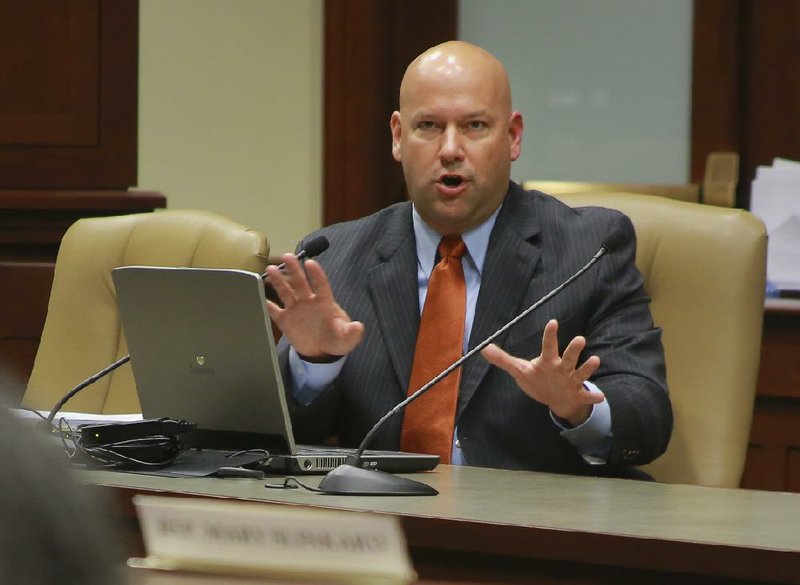Ticket sales for the Arkansas Lottery dipped by $33 million in fiscal 2013 from the previous year to $440 million, and the amount raised for college scholarships slipped by $7.6 million to $89.9 million, the lottery reported Wednesday.
The figures for the fiscal year that ended June 30 are detailed in a report that lottery officials sent to the Legislature’s lottery oversight committee.
Fiscal 2013 is the lottery’s first fiscal year since the lottery started selling tickets on Sept. 28, 2009, in which ticket sales and net proceeds for college scholarships dropped.
Lottery Director Bishop Woosley warned lawmakers in November that, on the basis of lagging sales, they could safely assume that the lottery would raise somewhere in the $89 million-$90 million range for college scholarships in fiscal 2013.
Woosley, who was promoted from chief legal counsel to be the lottery’s director in February 2012, initially projected that the lottery would sell $481 million in tickets and raise $98.5 million for college scholarships in fiscal 2013, after it sold $473 million in tickets and raised $97.5 million for college scholarships in fiscal 2012.
The lottery largely funds the Arkansas Academic Challenge Scholarship pro-gram, which has handed out more than 30,000 scholarships in each of the past three school years.
Sen. Robert Thompson, D-Paragould, co-chairman of the lottery oversight committee, said Wednesday that he hopes that the changes in the scholarship program enacted earlier this year “have prepared us for this.”
The lottery reported selling $383 million in tickets and raising $82.7 million for scholarships during its first nine months of ticket sales in fiscal 2010 and then selling $465 million in tickets and generating $94.2 million for scholarships the next fiscal year.
Scratch-off ticket sales fell by $36.8 million, or 9 percent, in fiscal 2013 compared with the previous fiscal year, and most of that drop occurred early in the year that started July 1, 2012.
While overall ticket sales for draw games, such as Powerball, increased, ticket sales for Mega Millions dropped by more than $11.6 million, Woosley said. The decline in Mega Millions sales alone cost the lottery more than $4.5 million in unrealized net proceeds, he said.
“The drop was a combination of the economy, the drought and the natural progression of the life of the lottery,” Woosley said.
“It is typical after two to three years for lotteries to experience some drop in sales and revenue based on the honeymoon period ending and some fatigue,” he said.
Michael Pakko, state economic forecaster and the chief economist at the Institute for Economic Advancement at the University of Arkansas at Little Rock, said renewed weakness in job growth in the state could be reducing some Arkansans’ discretionary income and hurting lottery sales. The increasing number of gamblers playing electronic games of skill at Oaklawn Park in Hot Springs and Southland Park in West Memphis also could be cutting into ticket sales, he said.
Oklahoma’s lottery saw its ticket sales decline and net proceeds decline for the first time in its fourth fiscal year of operations in fiscal 2009, according to Oklahoma lottery records. Ticket sales dropped from $204 million in fiscal 2008 to $193 million in fiscal 2009 before increasing to $199 million a year, where they have remained stalled, while net proceeds dropped from $71 million in fiscal 2008 to $69 million in fiscal 2009, where they have languished.
Fiscal 2008 was the Oklahoma lottery’s largest year for Powerball ticket sales, and Powerball sales dived to $91 million in fiscal 2009, said Rollo Redburn, that state’s lottery director.
But the North Carolina lottery’s ticket sales and net proceeds have increased each year since it started operations in the middle of fiscal 2006 to $1.5 billion in ticket sales and net proceeds of $459 million in fiscal 2012, according to North Carolina lottery records.
“We believe our success so far comes from keeping our games fresh and fun, listening to what our players like and don’t like about lottery games, programs and operations, and staying focused on our core products and core business practices,” said Van Denton, a spokesman for the North Carolina lottery.
Net proceeds for South Carolina’s lottery, which former Arkansas Lottery Director Ernie Passailaigue helped create, dipped during its third full fiscal year of operation from $287 million in fiscal 2004 to $280 million in fiscal 2005 as a result of the lottery selling more of the less-profitable scratch-offs, a lottery spokesman said. Ticket sales at the South Carolina lottery dropped for the first time from $1.1 billion in fiscal 2006 to $988 million in fiscal 2007 as a result of North Carolina starting its lottery.
With the help of $20 million a year in state general revenue, Arkansas’ lottery has financed Academic Challenge Scholarships for the past three school years.
About 34,500 students are expected to receive about $114 million in Academic Challenge Scholarships in fiscal 2014 - compared with about 32,960 students getting $133 million in fiscal 2013 - according to the latest projections from the state Department of Higher Education.
The dip in expected lottery net proceeds led state Rep. Mark Perry, D-Jacksonville, co-chairman of the lottery oversight committee, to suggest that the Lottery Commission consider starting “monitor games,” such as keno, on a trial basis. That led the nine-member commission last month to tacitly agree to study that option and consult other members of the oversight committee.
“We are always on the lookout for new games that will be exciting to our players,” Woosley said. “We must keep our game library fresh and make changes to existing games to maintain player interest.”
Front Section, Pages 1 on 07/11/2013

